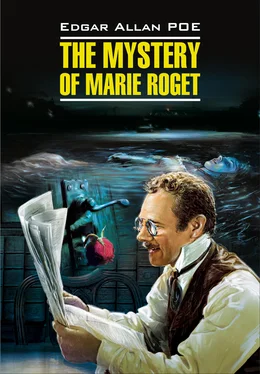That I now saw aright I could not and would not doubt; for the first flashing of the candles upon that canvas had seemed to dissipate the dreamy stupor which was stealing over my senses, and to startle me at once into waking life.
The portrait, I have already said, was that of a young girl. It was a mere head and shoulders, done in what is technically termed a vignette manner; much in the style of the favorite heads of Sully [75] Sully – Томас Салли (1783–1872), американский живописец (рожден в Англии)
. The arms, the bosom, and even the ends of the radiant hair melted imperceptibly into the vague yet deep shadow which formed the background of the whole. The frame was oval, richly gilded and filigreed in Moresque [76] richly gilded and filigreed in Moresque – ( уст. ) богато украшенный резьбой и позолотой в мавританском стиле
. As a thing of art nothing could be more admirable than the painting itself. But it could have been neither the execution of the work, nor the immortal beauty of the countenance, which had so suddenly and so vehemently moved me. Least of all, could it have been that my fancy, shaken from its half slumber, had mistaken the head for that of a living person. I saw at once that the peculiarities of the design, of the vignetting, and of the frame, must have instantly dispelled such idea – must have prevented even its momentary entertainment. Thinking earnestly upon these points, I remained, for an hour perhaps, half sitting, half reclining, with my vision riveted upon the portrait. At length, satisfied with the true secret of its effect, I fell back within the bed. I had found the spell of the picture in an absolute life-likeliness of expression, which, at first startling, finally confounded, subdued, and appalled me. With deep and reverent awe I replaced the candelabrum in its former position. The cause of my deep agitation being thus shut from view, I sought eagerly the volume which discussed the paintings and their histories. Turning to the number which designated the oval portrait, I there read the vague and quaint words which follow:
She was a maiden of rarest beauty, and not more lovely than full of glee. And evil was the hour when she saw, and loved, and wedded the painter. He, passionate, studious, austere, and having already a bride in his Art; she a maiden of rarest beauty, and not more lovely than full of glee; all light and smiles, and frolicsome as the young fawn; loving and cherishing all things; hating only the Art which was her rival; dreading only the pallet and brushes and other untoward instruments which deprived her of the countenance of her lover. It was thus a terrible thing for this lady to hear the painter speak of his desire to portray even his young bride. But she was humble and obedient, and sat meekly for many weeks in the dark, high turret-chamber where the light dripped upon the pale canvas only from overhead. But he, the painter, took glory in his work, which went on from hour to hour, and from day to day. And he was a passionate, and wild, and moody man, who became lost in reveries [77] lost in reveries – ( разг. ) погружен в мечтания
; so that he would not see that the light which fell so ghastly in that lone turret withered the health and the spirits of his bride, who pined visibly to all but him. Yet she smiled on and still on, uncomplainingly, because she saw that the painter (who had high renown) took a fervid and burning pleasure in his task, and wrought day and night to depict her who so loved him, yet who grew daily more dispirited and weak. And in sooth some who beheld the portrait spoke of its resemblance in low words, as of a mighty marvel, and a proof not less of the power of the painter than of his deep love for her whom he depicted so surpassingly well. But at length, as the labor drew nearer to its conclusion, there were admitted none into the turret; for the painter had grown wild with the ardor of his work, and turned his eyes from canvas merely, even to regard the countenance of his wife. And he would not see that the tints which he spread upon the canvas were drawn from the cheeks of her who sat beside him. And when many weeks had passed, and but little remained to do, save one brush upon the mouth and one tint upon the eye, the spirit of the lady again flickered up as the flame within the socket of the lamp. And then the brush was given, and then the tint was placed; and, for one moment, the painter stood entranced before the work which he had wrought; but in the next, while he yet gazed, he grew tremulous and very pallid, and aghast, and crying with a loud voice, “This is indeed Life itself!” turned suddenly to regard his beloved: – She was dead!
The Mystery of Marie Roget
Es giebt eine Reihe idealischer Begebenheiten, die der Wirklichkeit parallel lauft. Selten fallen sie zusammen. Menschen und zufalle modifieiren gewohulich die idealische Begebenheit, so dass sie unvollkommen erscheint, und ihre Folgen gleichfalls unvollkommen sind. So bei der Reformation; statt des Protestantismus kam das Lutherthum hervor. [78] Es giebt eine Reihe idealischer Begebenheiten, die der Wirklichkeit parallel lauft. Selten fallen sie zusammen. Menschen und zufalle modifieiren gewohulich die idealische Begebenheit, so dass sie unvollkommen erscheint, und ihre Folgen gleichfalls unvollkommen sind. So bei der Reformation; statt des Protestantismus kam das Lutherthum hervor. – ( нем. ) Параллельно с реальными событиями существует идеальная их последовательность. Они редко полностью совпадают. Люди и обстоятельства обычно изменяют идеальную цепь событий, а потому она кажется несовершенной, и следствия ее равно несовершенны. Так было с Реформацией – взамен протестантства явилось лютеранство ( Примеч. авт. )
There are ideal series of events which run parallel with the real ones. They rarely coincide. Men and circumstances generally modify the ideal train of events, so that it seems imperfect, and its consequences are equally imperfect. Thus with the Reformation; instead of Protestantism came Lutheranism.
Novalis
[79] Novalis – Новалис (наст. имя Фридрих фон Гарденберг) (1772–1801), немецкий поэт, философ
.
Moral Ansichten [80] Moral Ansichten – Нравственные воззрения
November 1842 – February 1843
There are few persons, even among the calmest thinkers, who have not occasionally been startled into a vague yet thrilling half-credence in the supernatural, by coincidences of so seemingly marvellous a character that, as mere coincidences, the intellect has been unable to receive them. Such sentiments – for the credences of which I speak have never the full force of thought – such sentiments are seldom thoroughly stifled unless by reference to the doctrine of chance, or, as it is technically termed, the Calculus of Probabilities [81] Calculus of Probabilities – теория вероятностей
. Now this Calculus is, in its essence, purely mathematical; and thus we have the anomaly of the most rigidly exact in science applied to the shadow and spirituality of the most intangible in speculation.
The extraordinary details which I am now called upon to make public, will be found to form, as regards sequence of time, the primary branch of a series of scarcely intelligible coincidences, whose secondary or concluding branch will be recognized by all readers in the late murder of Mary Cecila Rogers, at New York.
Читать дальше
Конец ознакомительного отрывка
Купить книгу












